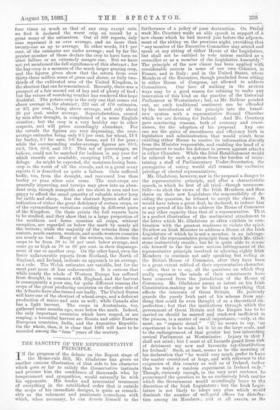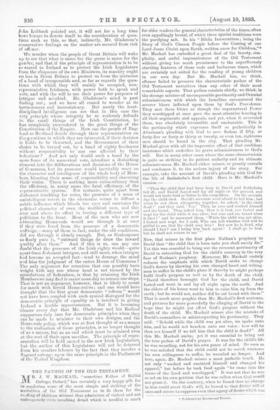THE SANCTITY OF THE REPRESENTATIVE PRINCIPLE.
IN the progress of the debate on the Report stage of the Home-rule Bill, Mr. Gladstone has given us another curious illustration of that side to his character which goes so far to satisfy the Conservative instincts and procure him the confidence of thousands who, by temperament and sympathies, would naturally be with his opponents. His tender and reverential treatment of everything in the established order that is outside the scope of his immediate designs, is quite as remark- able as the vehement and passionate iconoclasm with which, when necessary, he can devote himself to the furtherance of a policy of pure destruction. On Friday week Mr. Courtney made an able speech in support of a, new clause which he had moved just before the adjourn- went of the sitting on the previous night, providing .that " any member of the Executive Committee may attend and speak at any sitting of either House of the Legislature, but shall not be entitled to vote unless entitled as a councillor or as a member of the Legislative Assembly." The principle of the new clause has been applied with considerable success in some of our own Colonies, in France, and in Italy ; and in the United States, where' Members of the Executive, though precluded from sitting in either House of Congress, are allowed to address Committees. Our love of walking in the ancient ways may be a good reason for refusing to make any innovation of this kind on the practice of the historical Parliament at Westminster ; but, as Mr. Balfour pointed out, no sirch traditional sentiment can be offended by the introduction of the principle into the brand- new system with a representative Second Chamber which we are devising for Ireland. And Mr. Courtney gave convincing reasons, both of economy and conve- nience, for the adoption of his proposal. Any one can see the gains of smoothness and efficiency both in legislation and administration that would result from enabling either House to receive its information directly from the Minister responsible, and enabling the head of le Department to make his defence in person against attacks in either Chamber. While the Irish Establishment would be relieved by such a system from the burden of main- taining a staff of Parliamentary Under-Secretaries, the prerogative of voting would still remain the exclusive privilege of elected representatives. Mr. Gladstone, however, saw in the proposal a danger to the representative principle, and after a characteristic speech, in which he first of all tried—though unsuccess- fully—to elicit the views of the Irish Members, and then threw on their new Legislature the responsibility of de- ciding the question, he refused to accept the clause. It would have taken a great deal, he declared, to induce him at any period of his life to address the House of Commons in any other capacity than that of a representative. Th at is a perfect illustration of the sentimental attachment to the letter which Mr. Gladstone so often exhibits in com- bination with the greatest readiness to violate the spirit. To allow an Irish Minister to address a House of the Irish. Legislature of which he is not a member, is an infringe- ment of the representative principle from which Mr. Glad- stone instinctively recoils ; but he is quite able to recon- cile himself to the far more serious infringement of the representative principle involved in, allowing eighty Irish Members to continue not only speaking but voting in. the British House of Commons, after they have been to a great extent robbed of their representative character, —after, that is to say, all the questions on which they really represent the minds of their constituents have been removed from the jurisdiction of the House of Commons. Mr. Gladstone seems so intent on his Irish, Constitution-making as to be blind to everything that affects the interests of Great Britain. He jealously guards the purely Irish part of his scheme from any- thing that could be even thought of as a theoretical im- perfection ; but that the institutions through which the government of Great Britain and the Empire has to be carried on should be marred and rendered inefficient in the process, is a matter of small importance,—only, at the most, an " organic detail." ' If,' he seems to say, experiment is to be made, let it be on the large scale, and to the endangerment of that greater but less interesting central Parliament at Westminster. Injury to that I shall not mind ; but I must at all hazards guard from risk of detriment my new and favourite toy-Constitution for Ireland.' Such, at least, seems to be the meaning of his declaration that " he would very much prefer to have• the matter considered at large, and with reference to the exigencies of this country as well as of Ireland, rather than to make a random experiment in Ireland only."' Though, curiously enough, in the very next sentence he pronounced the question to be an exclusively Irish matter which the Government would accordingly leave to the discretion of the Irish Legislature ; but the Irish Legis= lature is not likely to adopt any plan which would diminish the number of well-paid offices for distribu- tion among its Members ; and at all events, as Sir john Lubbock pointed out, it will not for a long time have leisure to devote itself to the consideration of ques- tions such as this, so that, indirectly, Mr. Gladstone's conservative feelings on the matter are secured from risk of offence.
We wonder when the people of Great Britain will wake up to see that what is sauce for the goose is sauce for the gander, and that if the principle of representation is to be so sacred in Ireland as to protect the Irish Legislature from the eloquence of its own Ministers, its sanctity ought no less in Great Britain to protect us from the intrusion of a band of irresponsible and., so far as regards the ques- tions with which they will mainly be occupied, non- representative Irishmen, with power both to speak and vote, and with the will to use their power for purposes of intrigue and mischief. Mr. Gladstone's mind is past finding out ; and we have all ceased to wonder at its tortuousness and inconsistency. But surely the least- disciplined intelligence can see that in this case the very principle whose integrity he so zealously defends in the small things of the Irish Constitution, he has completely surrendered in the great things of the Constitution of the Empire. How can the people of Eng- land or Scotland decide through their representatives on the questions in which they are interested, if their decision is liable to be thwarted, and the Government of their choice to be turned out, by a band of eighty freelances without responsibility to any one affected by their behaviour ? And not only would such a band by the mere force of its numerical vote, introduce a disturbing element into the deliberations and decisions of the House of Commons, but its presence would inevitably react on the character and intelligence of the whole body of Mem- bers, blunting their sense of responsibility and obscuring their vision. There is nothing more extraordinary than the efficiency, in many cases the fatal efficiency, of the representative system. For instance, quite apart from dishonest truckling for votes, the presence of a mass of unintelligent voters in the electorate seems to diffuse a subtle influence which blinds the eyes and enervates the political character of even the worthiest men, and this over and above its effect in forcing a different type of politician to the front. Most of the men who are now advocating Home-rule would see through it at once if they were freed from the pressure of a democratic suffrage,—many of them in fact, under the old conditions, did see through it clearly enough. But, as Shakespeare so finely puts it, " outward things do draw the inward quality after them." And if this is so, can any one doubt that the presence of the Irish eighty would—quite apart from dishonest intrigue, and still more, when intrigue had become an accepted fact—tend to derange the mind and bias the judgment of the entire House of Commons ? The only argument for retention that can possibly have weight with any one whose head is not turned by the speculations of federalism, is that by retaining the Irish Members we may find it easier some day to retrace our steps. That is not an argument, however, that is likely to count for much with fervid Home-rulers ; and one would have thought that the first great democratic " reform " would not have been coupled with such cynical disregard for the democratic principle of equality as is involved in giving Ireland a double representation. But it is becoming clearer every day that Mr. Gladstone and his Radical supporters only care for democratic principles when they can be made to minister to their own designs, and the Home-rule policy, which was at first thought of as a means to the realisation of those principles, is no longer thought of as a means, but as an end which must be attained even at the cost of their open sacrifice. The principle'of repre- sentation will be held sacred in the new Irish Legislature, but the author of this Legislature will not be deterred from his creative labours by the fact that they involve a flagrant outrage upon the same principle in the Parliament of the United Kingdom.



































 Previous page
Previous page